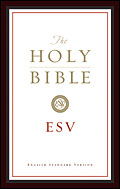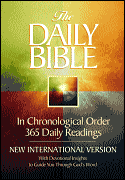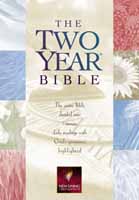Top Ten Signs You May Not Be Reading Your Bible Enough
9. You think Abraham, Isaac, and Jacob may have had a few hit songs during the '60s.
8. You open to the gospel of Luke and a World War II savings bond falls out.
7. Your favorite Old Testament patriarch is Hercules.
6. A small family of woodchucks has taken up residence in the Psalms.
5. You become frustrated because Charlton Heston isn't listed in either the concordance or the table of contents!
4. Catching the kids reading the Song of Solomon, you demand, 'Who gave you that stuff?!'
3. You think the Minor Prophets worked in the quarries.
2. You keep falling for it every time when your pastor tells you to turn to First Condominiums (and Second Hesitations).
1. The kids keep asking you too many questions about your usual bedtime story called, Jonah the Shepherd-Boy and His Ark of Many Colors.
The above list is from the very end of The Way of the Master Radio broadcast on November 30, 2006 (Hour 2). I use this list as a hopefully-humorous introduction to a serious topic, that of systematic Bible reading. In addition to memorizing verses of Scripture and in-depth study of particular passages, it is important to consistently be reading through God's Word chapter by chapter, book by book. By reading through the Bible in this way, Christians gain a grand scope of God's revelation and thus are much better equipped to understand smaller sections within the big picture. The beginning of the New Year, which is coming up soon, is a great time to begin systematically reading through the whole Bible. Now, I am not trying to set up a legalistic rule that every Christian must read through the entire Bible every year, but I hope to encourage my readers to have some plan to get to know all of God's Word better.
The following is a short list of resources that you may find helpful to begin systematic Bible reading:
 If you have an ESV paperback Bible, look in the front of the Bible before the preface for the section titled, "Getting Started: A Forty-Day Bible Reading Plan." This may be especially helpful for you if you've never read through the whole Bible before. The forty-day plan does not guide you through every chapter or even every book of the Bible, but it does acquaint you with some passages in which major teachings are introduced. Using this plan, you could read through these crucial Bible passages about 8 times in a year, even if you miss some days in your systematic Bible reading. In the back of this Bible there is also a chart for reading through the entirety of the text in one year.
If you have an ESV paperback Bible, look in the front of the Bible before the preface for the section titled, "Getting Started: A Forty-Day Bible Reading Plan." This may be especially helpful for you if you've never read through the whole Bible before. The forty-day plan does not guide you through every chapter or even every book of the Bible, but it does acquaint you with some passages in which major teachings are introduced. Using this plan, you could read through these crucial Bible passages about 8 times in a year, even if you miss some days in your systematic Bible reading. In the back of this Bible there is also a chart for reading through the entirety of the text in one year. This year I read through (or 'will have read through' on Dec. 31, Lord willing) the Daily Bible in Chronological Order. This was a very interesting way to read the Bible, because the passages are re-arranged according to the way that they occurred in history. So, for example, the Psalms that have a clear indication as to when they were written by David are placed within the narrative of David's life found in places such as 2 Samuel and 1 Chronicles, which are combined. The letters written by Paul are placed in the narrative of his life found in Acts. The 4 gospel accounts of Jesus' life are combined into 1 narrative, so that a timeline of His life becomes more readily apparent. If you do choose to read through this particular Bible this coming year, I would caution you that some of the way it is laid out is controversial. Biblical historians are not exactly certain on the timeline of some events, and so it is always good to check with several commentaries before coming to a conclusion whether to accept or reject the order this version of the Bible gives. Also, the man who arranged this Bible, F. LaGard Smith, writes notes before certain sections and these notes do not contain any reference to how he formed his opinions- so my suggestion is for the reader to skip these notes as much as possible and deal with what the Bible itself has to say.
This year I read through (or 'will have read through' on Dec. 31, Lord willing) the Daily Bible in Chronological Order. This was a very interesting way to read the Bible, because the passages are re-arranged according to the way that they occurred in history. So, for example, the Psalms that have a clear indication as to when they were written by David are placed within the narrative of David's life found in places such as 2 Samuel and 1 Chronicles, which are combined. The letters written by Paul are placed in the narrative of his life found in Acts. The 4 gospel accounts of Jesus' life are combined into 1 narrative, so that a timeline of His life becomes more readily apparent. If you do choose to read through this particular Bible this coming year, I would caution you that some of the way it is laid out is controversial. Biblical historians are not exactly certain on the timeline of some events, and so it is always good to check with several commentaries before coming to a conclusion whether to accept or reject the order this version of the Bible gives. Also, the man who arranged this Bible, F. LaGard Smith, writes notes before certain sections and these notes do not contain any reference to how he formed his opinions- so my suggestion is for the reader to skip these notes as much as possible and deal with what the Bible itself has to say. Starting this January, I'm planning to read through the Two Year Bible. This Bible is formatted in such a way as to be read through in 2 years by a 7 minute Bible reading each day with a portion from the Old Testament, one from the New Testament, and one each from the Psalms and the Proverbs. These short Bible readings will leave time for more in-depth Bible study of certain passages. My one concern with the format of this Bible is that with a daily reading consisting of several short passages from different parts of Scripture, it may be harder for me to remember what I read last (it may be kind of like trying to watch 4 different TV shows at once). If you choose to read through this Bible, I would caution you that the Two Year Bible is in the New Living Translation, which, although translated by a team of excellent scholars, seems to be more concerned with being easy to read than with being an accurate reflection of the specific words and phrases communicated by God in the original Greek and Hebrew. So, while I have no problem with this translation for systematic Bible reading in which the goal is to gain familiarity with the overall biblical text, I would strongly suggest that in seeking to do in-depth Bible study you should turn to a more literal translation such as the New American Standard Bible or the English Standard Bible (though in doing in-depth Bible study, you will always want to check more than one translation).
Starting this January, I'm planning to read through the Two Year Bible. This Bible is formatted in such a way as to be read through in 2 years by a 7 minute Bible reading each day with a portion from the Old Testament, one from the New Testament, and one each from the Psalms and the Proverbs. These short Bible readings will leave time for more in-depth Bible study of certain passages. My one concern with the format of this Bible is that with a daily reading consisting of several short passages from different parts of Scripture, it may be harder for me to remember what I read last (it may be kind of like trying to watch 4 different TV shows at once). If you choose to read through this Bible, I would caution you that the Two Year Bible is in the New Living Translation, which, although translated by a team of excellent scholars, seems to be more concerned with being easy to read than with being an accurate reflection of the specific words and phrases communicated by God in the original Greek and Hebrew. So, while I have no problem with this translation for systematic Bible reading in which the goal is to gain familiarity with the overall biblical text, I would strongly suggest that in seeking to do in-depth Bible study you should turn to a more literal translation such as the New American Standard Bible or the English Standard Bible (though in doing in-depth Bible study, you will always want to check more than one translation). At some time in the future, I'm planning to read through For the Love of God, volumes 1 and 2. This is a 1 year Bible reading plan with comments by the excellent New Testament scholar D.A. Carson, giving information on how each passage fits into the overall context of the story of God's work through history, as perfectly presented in the Scripture. This Bible reading plan was recommended to me by my Biblical Hermeneutics professor, Dr. Stephen Wellum.
At some time in the future, I'm planning to read through For the Love of God, volumes 1 and 2. This is a 1 year Bible reading plan with comments by the excellent New Testament scholar D.A. Carson, giving information on how each passage fits into the overall context of the story of God's work through history, as perfectly presented in the Scripture. This Bible reading plan was recommended to me by my Biblical Hermeneutics professor, Dr. Stephen Wellum.












1 Comments:
Excellent. Our church is doing a Bible Reading Plan that our Elders put together found HERE.
I am home, unable to attend our morning service today, because my 6 children have the flu. I got on your site via Challies. It has blessed me this morning... been very edifying.
Press on in HIS truth and HIS love for HIS glory.
Post a Comment
<< Home